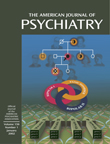Female Psychiatrists
To the Editor: I greatly enjoyed reading the article by Erica Frank, M.D., M.P.H., and colleagues about female psychiatrists (1). However, I was amazed that the authors made so little of the fact that female psychiatrists are almost twice as likely as other female physicians to be the main caregivers of preschool children. They neglected to investigate whether the perceived high stress level of their study group could be attributed largely to this factor (although the physicians interviewed were discussing work-related stress). Zachary Stowe, M.D., of Emory University pointed out in a grand rounds at California Pacific Medical Center several years ago that the demographic group most likely to experience depression is mothers of children age 4 and younger. Personally speaking, I found that the years when I struggled to work, run the household, and care for my toddler and preschooler without much domestic help were as stressful as internship and far more stressful than residency (in which I “worked” two to three times as many hours but got a lot more sleep). I am very grateful for the opportunity I had to be with my children when they were young and feel melancholy as my younger child gets ready for kindergarten. However, I also notice my stress level dropping and the enjoyment of my work increasing. It would be interesting if the authors could go back and look specifically at the experience of those mothers.
In fact, the authors’ study provides a wonderful opportunity to look at how female physicians attempt to combine the commitments of motherhood and medicine. In fact, there is all too little discussion about how to do both. Parents who do not spend the majority of their time with their small children have no idea of the balancing act and regrets that go into each decision about allocation of their time. I think it is true that many female doctors who want to raise their children choose psychiatry for the flexibility and time boundaries that it offers and because it still allows for a rich and exciting professional life. I would also be interested in hearing about the cohort of psychiatrists in the study after 8 years, when their preschoolers are older and more independent. I would not be surprised to learn that the group has become more accepting of professional burdens, is working longer hours, and is feeling less stressed.
1. Frank E, Boswell L, Dickstein LJ, Chapman DP: Characteristics of female psychiatrists. Am J Psychiatry 2001; 158:205-212Link, Google Scholar



